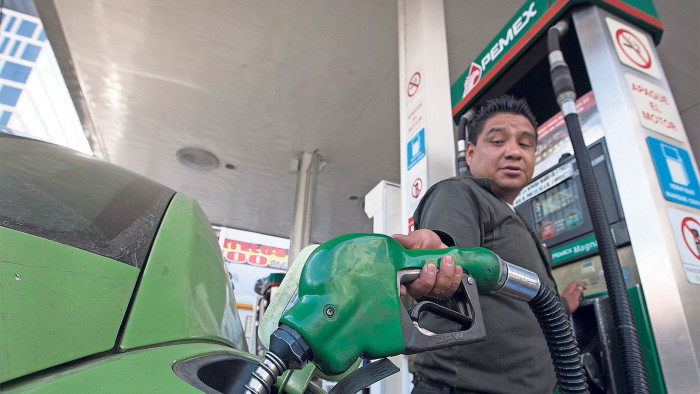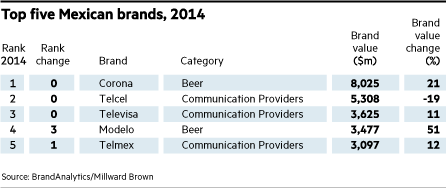Competition will force Pemex to come up with slicker act

Roula Khalaf, Editor of the FT, selects her favourite stories in this weekly newsletter.
Wanted: sharp new image for septuagenarian Mexican company with loyal following and the kind of brand recognition many companies would kill for.
It sounds like an advertising agency’s dream. But the company in question is widely believed to be bloated, corrupt and inefficient. Its ability to maintain its market share in future is by no means guaranteed, and though it faces immediate challenges, it will not be able to deliver results overnight.
The company is Pemex, the state oil producer, which is facing competition for the first time since its creation in 1938, under a landmark reform pushed through by Enrique Peña Nieto, Mexico’s president. Legislation that will open the sector to private investment was passed in August. Private oil companies, including foreign groups, are expected to start piling in next year.
Pemex must reinvent itself if it is to survive. The company has been dogged by a reputation for corruption, including the so-called Pemexgate election campaign finance scandal in the 2000 presidential elections. But at the same time, it is revered by many as a national asset (polls show a majority oppose the reform). Others regard the company as a relic.
How to sell its new image looks as tricky as marketing Marmite, the UK tar-coloured yeast extract loved and loathed in equal measure. “Pemex has to win the future,” is the verdict of Rodolfo Milesi, head of the London-based consultancy Branding Latin America.
Under the leadership of Emilio Lozoya, a turnround specialist, Pemex is already in the process of reorganising its activities into two main units: exploration and production and industrial transformation. The latter will bring together natural gas, refining and petrochemicals.
The company has a new remit: to become a “productive state enterprise” – a kind of public company run and performing as if it were in the private sector, and competition will force it to become a meritocracy rather than a bureaucracy.
But for many Mexicans, change will not occur until Pemex’s monopoly on petrol station sales ends at the start of 2016. Private companies will be limited to buying fuel from Pemex for one year, but from 2017 can source from wherever they like.
That could be a golden opportunity for rival oil companies.

Pemex fuel stations are franchised rather than owned by the state company. While Pemex-suited attendants currently fill up motorists’ tanks, new operators might offer cheaper self-service. Prices are likely to be a determinant, but it remains to be seen if motorists ditch Pemex because they regard it as old-fashioned, or stick with the brand because they would rather buy from the state than a foreign supplier.
Pemex, which has recently worked with Ogilvy Public Relations on its image, expects refreshing its brand to be a gradual process. But Mr Lozoya already has plans to “relaunch the Pemex brand” and revamp the image of its franchised filling stations.
The company overall will target its marketing efforts carefully and hopes to boost international exposure “not as an old-style national oil company, but more like a Petronas or a Statoil”, says Rolando Galindo, investor relations manager, referring to the Malaysian and Norwegian state companies. He adds that the company does not want to second-guess the market “You’re not going to see thousands of Pemex adverts, it’s going to be very focused.
“There has to be something to back this all up . . . or we could fall into the trap of ‘What are these guys promising if they haven’t done anything?’” He expects greater efficiencies and higher production that he hopes will reinvigorate the brand.
Though companies rebranding themselves often try to freshen up their logos, do not expect the Pemex emblem of an eagle and a drop of oil in Mexico’s green, white and red colours to be supplanted yet, Mr Galindo says.
“The logo is the last thing I’d change,” agrees Julio Madrazo, a Mexican consultant. “Branding is not just about changing the logo. A true brand becomes a culture – it’s the experience.
“[They need] a whole different corporate culture. If Pemex doesn’t transform itself into a productive and efficient company, it will be like an old car – one that consumes a lot of gas, is uncomfortable, and isn’t so safe.”
Mr Milesi of Branding Latin America fears Pemex is not proactive enough in overhauling its image. “I don’t think they realise the importance of reconquering the hearts of Mexicans – or can see business opportunities,” he says.
Comments